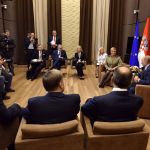Instead of New York, the President will travel to Moscow.
In mid-October, Croatian President Kolinda Grabar-Kitarović will arrive on an official visit to Moscow, where she will meet with Russia’s President Vladimir Putin. This will be a politically sensitive visit since Croatia is a member of the EU and NATO, but at the same time it will be multidimensional, according to sources from the Office of the President, reports Večernji List on September 2, 2017.
The visit will have both political and economic dimensions. The President’s visit to Putin also means that Croatia accepts the reality that Russia is a global power without which no comprehensive peace can be achieved, nor can there be a successful fight against international terrorism, which endangers security in the Southeast Europe. After a recent meeting with US President Donald Trump during a Three Seas Initiative summit in Warsaw, President Grabar-Kitarović called on the United States to again become more engaged in the region. Croatia was also recently visited by a number of US senators who were invited by Prime Minister Andrej Plenković.
The President will also talk with Putin about an agreement on the Russian-Croatian economic forum, and after Moscow, she will visit the United States. However, she will miss the annual session of the UN General Assembly in September. Only Prime Minister Andrej Plenković will represent Croatia there, and not both the President and the Prime Minister, as it was reported earlier.
In the forthcoming period, the President will focus on relations with Bosnia and Herzegovina and Serbia, and it is expected that Serbian President Aleksandar Vučić will be invited to visit Croatia, which should happen by the end of the year. While the visit is probable, it is still not certain, since Croatia expects the visit to be substantive, and not just a matter of protocol. This means that a real shift in Croatian-Serbian relations has to be agreed prior to the visit.
The Office of the President also says that Grabar-Kitarović will not comment on latest statements by Bakir Izetbegović, the leader of Bosniaks in Bosnia and Herzegovina, who gave a series of comments criticizing Croatia, but adds that Islamization is perceived as a problem in Bosnia and that the focus on relations with Bosnia and Herzegovina will be on political reforms and changes to the electoral law.
Translated from Večernji List.








